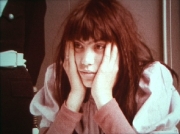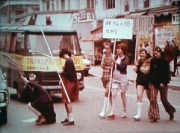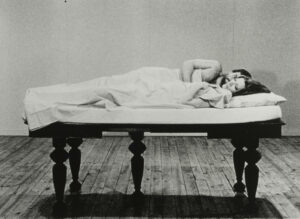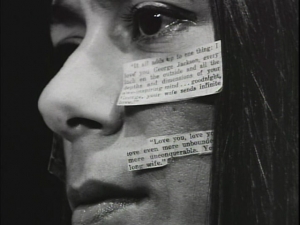Feminist counter-narratives
Yvonne Rainer / Jacques Kebadian
Wednesday, March 12, 2008 at 8 p.m.
at Le Méliès cinema
Screening in the presence of Jacques Kebadian
and Johanna Renard (PhD student).
Albertine, le souvenir parfumé de Marie Rose by Jacques Kebadian & Collectif Eugène Varlin (1972, 25 min)
 A cheeky, anti-authoritarian comedy, “Albertine” is a film manifesto for the insurrection of youth and desire. It tells the story of a teenager in rebellion against school, the rancid family and religion, and features young girls and boys aged 14 to 18 demanding their right to unfettered sexuality and the right to abortion for minors. (Text: AI&KQ)
A cheeky, anti-authoritarian comedy, “Albertine” is a film manifesto for the insurrection of youth and desire. It tells the story of a teenager in rebellion against school, the rancid family and religion, and features young girls and boys aged 14 to 18 demanding their right to unfettered sexuality and the right to abortion for minors. (Text: AI&KQ)

A committed documentary filmmaker, assistant to Robert Bresson from 1965 to 1969, author of a feature-length film about Trotsky (1967), member of the Atelier de Recherche Cinématographique (a group of militant, libertarian filmmakers, close to institutional psychotherapy and the alternative clinic at La Borde, who filmed the struggles of 1968) in 1967-69, then of the short-lived Eugène Varlin collective, Jacques Kebadian went on to make numerous films linked to Armenian memory (Que sont mes camarades devenus? Mémoires arméniennes), the struggles of undocumented African families (D’une brousse à l’autre, 1998), the incandescent literature of Pierre Guyotat or the Zapatista march in Mexico (La Fragile Armada, 2005, co-directed with Joani Hocquenghem). (distribution: le peuple qui manque)
Film about a woman who… by Yvonne Rainer (1974, 105min)
A decisive and rare film from the American avant-garde, beautifully photographed by Babette Mangolte, Film about a woman who… by choreographer Yvonne Rainer, narrates, fragmentarily and through intimate conversations, the amorous relationships between men and women, masterfully anticipating Laura Mulvey’s pioneering feminist text, Visual pleasure and Narrative Cinema, published in 1975, a critical analysis of narrative film, and particularly of American Hollywood cinema, in its construction of a sexist iconography and filmic language. Film about a woman who is thus a counter-narrative project designed to counter identification, while at the same time becoming an expression of subjective experience and feminist consciousness. “I felt authorized – at a time when I was becoming interested in the question of narrative and storytelling – to explore my own life as source material for my work, to pay closer attention to my own experiences, just as myself as a historical subject.” (Texte : AI&KQ)
Yvonne Rainer studied dance in New York with Martha Graham and Merce Cunningham before co-founding the Avant-garde Dance group at the Judson Dance Theater in 1962, which became the center of New York’s experimental contemporary dance scene. In 1965, Yvonne Rainer published a seminal manifesto inviting artists to reject spectacle, virtuosity and all other types of dance artifice in favor of a revolutionary aesthetic stripped of the superfluous. In the early 1970s, Yvonne Rainer returned to the narrative and gave a political dimension to her work. She left the world of dance in 1974 to devote herself to filmmaking, in order to work with a more permanent tool than movement. This abandonment was also linked to her gradual commitment to feminism. Nevertheless, experimentation, fragmentation, unusual juxtaposition and an eloquent demarcation or break with aesthetic postulates are elements that Rainer transposed from dance to screen in works such as Lives of Performers (1972), Film about A Woman Who… (1974), Kristina Talking Pictures (1976), Journeys from Berlin/1971 (1980), The Man Who Envied Women (1985), Privilege (1991) and Murder and Murder (1996).

